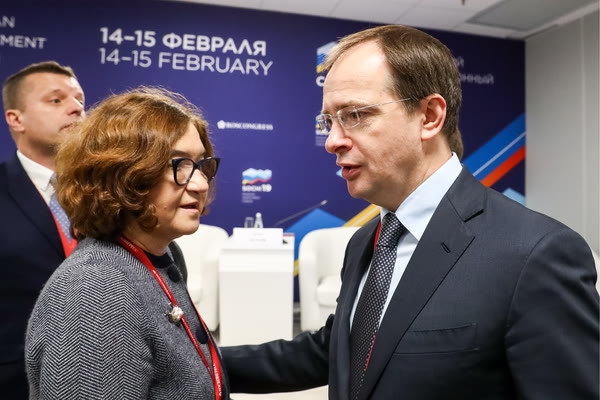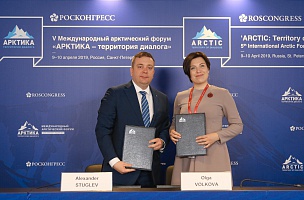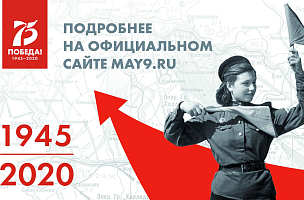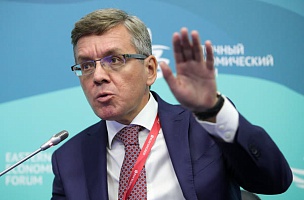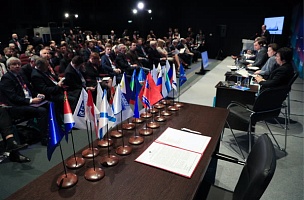KEY CONCLUSIONS
Russia occupies a leading place in culture
«We cannot now deny one truth, namely, that in some respects we occupy a leading place in the world of culture», Olga Golodets, Deputy Prime Minister of the Russian Federation, said.
Culture must be accessible to all society
«It’s the country’s task not just to preserve and enrich what we have but to create a new cultural space in the Russian Federation, to look deep within, and to refashion [cultural, Ed.] policy in such a way as to make it accessible all across Russia’s expanses», Golodets said.
Support fr om private investors plays an important role in the development of culture
«Without private support, nothing is possible; private support is like society’s representative», Marina Andreykina, First Deputy Art Director of the A.P. Chekhov Moscow Art Theatre, said.
«In 2014, the ratio of public and raised financing came to 69% fr om the state budget and 31% from sponsors. In 2018, the percentage was 31.8% from public funding, with 68% of the money coming from museum earnings and money received from museum partners, sponsors, patrons, and philanthropists», Zelfira Tregulova, General Director of the State Tretyakov Gallery, said.
«The museum of the 21st century, the culture of the 21st century, is not so much about contemplation as participation; we support those projects that possess this participation [...] Joint participation in the creation of a cultural product when culture is not produced by someone for society but together with society,» Oksana Oracheva, General Director of the Vladimir Potanin Charitable Foundation, said.
«Lukoil will soon be opening a theatre built at its own expense. [...] It is their goal to create a new cultural environment in the region wh ere their enterprise has a presence», Golodets said.
PROBLEMS
A lack of private support for many cultural institutions
«48% of our financing is budgetary, and as for private support, it is less than 3%; we earn the rest ourselves», Andreykina said.
«This is one-time support, it isn’t systemic, and it isn’t something the museum can count on, because there is no distinct charity programme in which we could permanently participate within the territory», Alla Khatyukhina, Director of the Yaroslavl Art Museum, said.
«Sometimes, when we turn to patrons, to sponsors, this is what we hear: I’ll help with this; I won’t help with this; I’ll donate money for this; I won’t donate money for this. People have their own positions, and they are very deep-felt», Golodets said.
Lack of incentive to invest in culture
«This is about creating the most favourable climate for business to invest in culture, because business leaders often take this money out of their own pockets», Tregulova said.
«For us, this is not an investment but rather a method of art patronage aimed at preserving the cultural values of our country and creating favourable life conditions», Oleg Zhukov, Partner at TM Defence, said.
«As soon as a name appears on the playbill, the tax officers are sure to come and ask to see the contract,» Andreykina said.
SOLUTIONS
The national culture project calls for the creation of regional cultural centers
«4 new growth points were created. [...] Vladivostok, Sevastopol, Kaliningrad, and Kemerovo. [...] This experience must also be spread to other industrial cities, wh ere industrial and cultural policy, a policy for the creating of a cultural space must be balanced», Golodets said.
The introduction of digital technology to culture
«This is a question of a completely new innovative approach to involving all museum objects in cultural life. [...] 7–8 years ago, a digital collection was more like a statistical anomaly, but now it is millions and millions of museum objects», Vladimir Medinsky, Minister of Culture of the Russian Federation, said.
A creative and dynamic approach for cultural institutions and regional authorities to the search for investors
«The search for funds and the selection of allies with which to hold a major event require so much work on the part of the cultural community. People need to be infected with the idea», Golodets said.
«Nowadays there are people who are ready to empathize, who are willing to invest, but it must be a very meaningful and significant cultural product», Golodets said.
«What motivates patrons to donate money? [...] An interest in specific individuals in this specific art», Andreykina said.
«So much lies in the hands of the museums themselves. We know from the example of regional museums, from Yekaterinburg, that there are opportunities in the regions, but everything depends on the position of the regional authorities», Tregulova said.
Creating incentive to invest in culture
«It [the law on patronage, Ed.] comes into effect as of this year. [...] The tax deduction has increased to 30%, [...] but besides that, there is another article that provides the right to include in the investment tax deduction on income tax all donations made to cultural institutions. [...] This rate is quite revolutionary. In this case, we have reached out a hand to our province and to those entrepreneurs who would be willing to make substantial investments in the organization of culture», Medinsky said.


